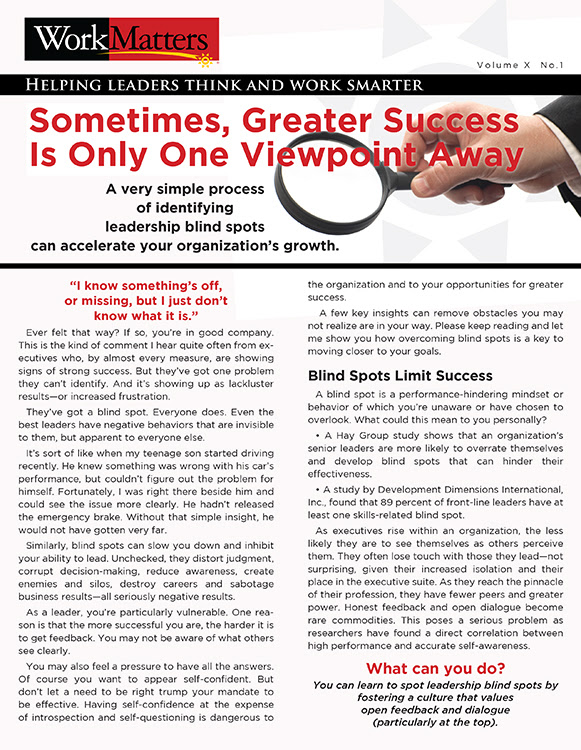On the path to improvement, there’s one thing for certain–you’re going to hit a roadblock.
 It’s inevitable. Could be a number of reasons:
It’s inevitable. Could be a number of reasons:
- Perhaps you fall back into patterns that give you problems in the first place. Human beings are creatures of habit. (“I’m doing what I know how to do on autopilot.”)
- Maybe you have a negative attitude to begin with that makes you skeptical about your chances of making the improvement in the first place. (“I knew it would never work.”)
- Or maybe something surprising or unforeseen happens that throws a wrench in your plans. You weren’t prepared for it. (“Well, I never expected that to happen!”)
Depending on the situation, you might feel like a failure, want to give up, or blame the problem on someone else.
Much like a person who says, “I want to lose weight.” He makes the commitment to stop eating unhealthy foods, yet a few days later, he can’t resist the donuts during a coffee break. He gives up trying to diet or rationalizes the situation to discount his commitment. Or he blames the person who brought the donuts.
The same principle applies to teams. In my recent work with a number of teams in different organizations, it’s clear that they want to improve performance.
Some teams are working on how they communicate. They want to strengthen interpersonal relations and understand each other better to function at their best. Other teams are working on their productivity. They get along well, but they want to get better results.
As they explore new best practices and commit to taking action, they’re fired up. They start on a new path that looks promising. They’ve talked through many issues and everyone seems to be on the same page.
But there’s often a missing piece of the process that goes unnoticed. They forget to develop a “correction mechanism.”
It may sound counterintuitive, but the more success you want, the more failure you should expect. Failure is not the opposite of success. It’s a part of the success process.
So what’s your correction mechanism?
How will you know what to look for to know when you need to make a turn, try a different approach or abandon a specific project?
Wouldn’t it be nice to have something like a GPS that recalibrates directions for you when you’re off path in your work?
Although each team is different, I see them hitting some common roadblocks like:
- Returning to a group of silos when they committed to working as a greater whole.
- Blaming the team leader for the problems instead of assuming greater accountability themselves.
- Allowing personality clashes to escalate so they impede productivity.
Whatever your team’s situation, I encourage you to identify how you will handle roadblocks in advance.
Know that challenges, frustrations, losses, etc. are a normal part of the process. Determine what the expected response will be. Don’t let it throw you off course.
To help you move forward more easily, here are a couple of suggestions:
First, know when you’ve hit a roadblock. Some people don’t even acknowledge them. They’ll worker harder and faster wondering why they’re not making progress.
It’s like hitting a nail as you’re driving down the road. Your tire is deflating, but you’re speeding up to try to get to your destination.
Secondly, act quickly. Address the issue as soon as possible. Don’t let it linger.
Talk to the team member where there may be a conflict. Put an issue on the table that needs to be discussed as a team. These kinds of actions could be part of your accepted “auto correction” process.
What tools or sources for correction will work best for you?
What’s your process to get you back on the right path?
Only you can determine your correction mechanism in a given situation.
Here are a couple of possibilities to consider:
- Revisit team or company vision/strategy. That way, you’ll align or realign what you’re doing so it makes sense in the bigger context. Determine if your actions are really leading you to the right destination.
- Talk to someone you trust. It could be your boss, partner or team member. You might not be able to see the view you need on your own. You’ll get better perspective as you determine next steps.
On a personal level, when you’re thrown off course, your best correction mechanism may be a family member or close friend. For the most difficult challenges or roadblocks, your correction mechanism may be your faith or values.
In business and life, it’s not always about accomplishment, but about alignment–aligning yourself with what really matters to you.
By doing so, you’ll be guided as opposed to pushing so hard.
You’ll navigate the roadblocks more easily and enjoy the journey a lot more.
PS – Sometimes you hit roadblocks because of leadership blind spots. That’s the topic of my latest print newsletter about how to overcome leadership blind spots.

Download a copy HERE.
(Feel free to share it with a friend or colleague who may benefit.)
You’ll gain insights to help you see what you might be missing.
